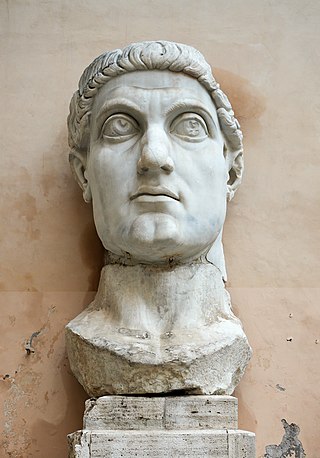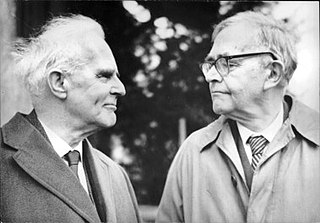Arianism is a Christological doctrine considered heretical by all mainstream branches of Christianity. It is first attributed to Arius, a Christian presbyter who preached and studied in Alexandria, Egypt. Arian theology holds that Jesus Christ is the Son of God, who was begotten by God the Father with the difference that the Son of God did not always exist but was begotten/made before time by God the Father; therefore, Jesus was not coeternal with God the Father, but nonetheless Jesus began to exist outside time.

Flavius Julius Constans, also called Constans I, was Roman emperor from 337 to 350. He held the imperial rank of caesar from 333, and was the youngest son of Constantine the Great.

Constantine I, also known as Constantine the Great, was a Roman emperor from AD 306 to 337 and the first Roman emperor to convert to Christianity. He played a pivotal role in elevating the status of Christianity in Rome, decriminalizing Christian practice and ceasing Christian persecution in a period referred to as the Constantinian shift. Constantine is also the originator of the religiopolitical ideology known as Constantinism, which epitomizes the unity of church and state, as opposed to separation of church and state. He founded the city of Constantinople and made it the capital of the Empire.

Galerius Valerius Maximianus was Roman emperor from 305 to 311. During his reign he campaigned, aided by Diocletian, against the Sasanian Empire, sacking their capital Ctesiphon in 299. He also campaigned across the Danube against the Carpi, defeating them in 297 and 300. Although he was a staunch opponent of Christianity, Galerius ended the Diocletianic Persecution when he issued the Edict of Toleration in Serdica (Sofia) in 311.

Maximus the Confessor, also spelled Maximos, otherwise known as Maximus the Theologian and Maximus of Constantinople, was a Christian monk, theologian, and scholar.

Flavia Julia Helena, also known as Helena of Constantinople and in Christianity as Saint Helena, was an Augusta of the Roman Empire and mother of Emperor Constantine the Great. She was born in the lower classes traditionally in the Greek city of Drepanon, Bithynia, in Asia Minor, which was renamed Helenopolis in her honor, although several locations have been proposed for her birthplace and origin.
The Apostolic Fathers, also known as the Ante-Nicene Fathers, were core Christian theologians among the Church Fathers who lived in the 1st and 2nd centuries AD who are believed to have personally known some of the Twelve Apostles or to have been significantly influenced by them. Their writings, though widely circulated in early Christianity, were not included in the canon of the New Testament. Many of the writings derive from the same time period and geographical location as other works of early Christian literature which came to be part of the New Testament.
Prevenient grace is a Christian theological concept that refers to the grace of God in a person's life which precedes and prepares to conversion. The concept was first developed by Augustine of Hippo (354–430), was affirmed by the Second Council of Orange (529) and has become part of Catholic theology. It is also present in Reformed theology, through the form of an effectual calling leading some individuals irresistibly to salvation. It is also in Arminian theology, according to which it is dispensed universally in order to enable people to respond to the offer of salvation, though it does not ensure personal acceptance.

Heinrich Emil Brunner (1889–1966) was a Swiss Reformed theologian. Along with Karl Barth, he is commonly associated with neo-orthodoxy or the dialectical theology movement.

During the reign of the Roman Emperor Constantine the Great, Christianity began to transition to the dominant religion of the Roman Empire. Historians remain uncertain about Constantine's reasons for favoring Christianity, and theologians and historians have often argued about which form of early Christianity he subscribed to. There is no consensus among scholars as to whether he adopted his mother Helena's Christianity in his youth, or, as claimed by Eusebius of Caesarea, encouraged her to convert to the faith he had adopted.
Philip Francis Esler is the Portland Chair in New Testament Studies at the University of Gloucestershire. He is an Australian-born higher education administrator and academic who became the inaugural chief executive of the UK's Arts and Humanities Research Council (AHRC) in 2005, remaining in that role until 2009. From 1995 to 2010 he was professor of Biblical criticism at St Andrews University. From 1998 to 2001 he was vice-principal for research and provost of St Leonard’s College at St Andrews. During the years 1999 to 2003 he served as a member of the board of Scottish Enterprise Fife. From October 2010 to March 2013 he was principal at St Mary’s University College Twickenham. He had an earlier career as a lawyer, working in Sydney during 1978-81 and 1984-92 as an articled clerk, then solicitor and barrister.
Kevin Jon Vanhoozer is an American theologian and current research professor of Systematic Theology at Trinity Evangelical Divinity School (TEDS) in Deerfield, Illinois. Much of Vanhoozer's work focuses on systematic theology, hermeneutics, and postmodernism.

Ben Witherington III is an American Wesleyan-Arminian New Testament scholar. Witherington is Professor of New Testament Interpretation at Asbury Theological Seminary, a Wesleyan-Holiness seminary in Wilmore, Kentucky, and an ordained pastor in the United Methodist Church.
Peter James Leithart is an American author, minister, and theologian, who serves as president of Theopolis Institute for Biblical, Liturgical, & Cultural Studies in Birmingham, Alabama. He previously served as Senior Fellow of Theology and Literature as well as Dean of Graduate Studies at New Saint Andrews College. He was selected by the Association of Reformed Institutions of Higher Education to be one of the organization's 2010–2012 Lecturers. He is the author of commentaries on the Book of Kings, the Book of Samuel, the Books of Chronicles, the Book of Revelation, as well as a Survey of the Old Testament. Other works include books on topics such as Dante's Inferno, Shakespeare, Jane Austen, and a biography of Constantine. He is also the author of a book of children's bedtime stories titled Wise Words based on the Book of Proverbs.
John Bainbridge Webster (1955–2016) was an Anglican priest and theologian writing in the area of systematic, historical, and moral theology. Born in Mansfield, England, on 20 June 1955, he was educated at the independent Bradford Grammar School and at the University of Cambridge. After a distinguished career, he died at his home in Scotland on 25 May 2016 at the age of 60. At the time of his death, he was the Chair of Divinity at St. Mary's College, University of St Andrews, Scotland.
Gregory Kimball Beale is a biblical scholar, currently a Professor of New Testament and Biblical Theology at Reformed Theological Seminary in Dallas, Texas. He is an ordained minister in the Orthodox Presbyterian Church. He has made a number of contributions to conservative biblical hermeneutics, particularly in the area of the use of the Old Testament in the New Testament and is one of the most influential and prolific active New Testament scholars in the world. He served as the president of the Evangelical Theological Society in 2004. In 2013, he was elected by Westminster Theological Seminary to be the first occupant of the J. Gresham Machen Chair of New Testament. At his inauguration he delivered an address titled The Cognitive Peripheral Vision of Biblical Writers.
Stanley E. Porter is an American-Canadian academic and New Testament scholar, specializing in the Koine Greek grammar and linguistics of the New Testament.

Oliver D. Crisp is a British theologian who currently works as Professor of Analytic Theology at the University of St Andrews, and was formerly a professor of systematic theology at Fuller Theological Seminary in Pasadena, California.
Bruce Lindley McCormack is Charles Hodge Professor Emeritus of Systematic Theology at Princeton Theological Seminary. His work focuses on the history of modern theology. McCormack has proposed that Karl Barth's view of Scripture has been misinterpreted, and has proposed a "Neo-Barthian" interpretation.
Peter Runham Ackroyd was a British Biblical scholar, Anglican priest, and former Congregational minister. From 1961 to 1982, he was the Samuel Davidson Professor of Old Testament Studies at the University of London. He was also President of the Society for Old Testament Study in 1972.









